Words: Oliver Bennett, Photographer: Andy Hall
Taken from The Times Magazine, 16 January 1999
Jarvis Cocker spent years on the outside looking in before he found mainstream success with Pulp. So who better to take on the role of television art master, promoting the vision of the world's maverick talents.
Last May, and it is the second hottest day in Delhi this century. The cab drivers say the 47 degree centigrade heat is due to the nuclear testing - we are in the midst of last summer's stand-off between Pakistan and India, not far from where the bombs are being exploded underground. An apocalyptic mood is in the air. Water and Electricity services are breaking down constantly.
A couple of hundred miles north in Chandigarh the situation is a little better, although the sub-Himalayas occasionally beckon tantalisingly through the haze. This tidy Indian city was designed by French mega-brutalist Le Corbusier, commissioned after partition to proclaim the birth of the modern Indian state. Now the 50-year-old city, divided into Orwellian "sectors", looks dusty and featureless in the killer heat.
A lanky fellow in a cowboy hat, pyjamas and flip-flops is immediately noticeable on the veld outside the rectilinear parliament building. It is Jarvis Cocker, singer with Pulp, who has flown here to make an episode of a documentary series on "Outsider Art". For Chandigarh is the home of Nek Chand, who has made an extraordinary "environment" called The Rock Garden in a margin of the city. It is the fantasy foil to Le Corbusier's futuropolis, acre upon acre of enchanting sculpture forged from the detritus of Chandigarh's building boom.
Cocker and his crew seem exhausted. Chand's environment is the last stop in a schedule that has taken in France, the US, Germany and Mexico, and what with the heat and the travel, no one is quite able to finish a sentence. "Jarv" is the mascot of a most irritable little group, although he just about manages to remain sprightly. A local reporter asks him about "his Pulp". "What can I say about my Pulp?" he responds. "I've been doing it for 18 years but only got successful about four years ago." And one can see why Cocker got this job: these programmes manifest his admiration for "people who are so single-minded that they just do something and don't bother about what people think about it". Just as Cocker did himself in Pulp's dole-funded longueurs, before his transformation into the thinking fan's favourite anti-pop star.
Outsider art was popularised in the war years by the French artist Jean Dubuffet, who coined the term "art brut" - "raw art". His notion was to mine the seam of creativity in the margins of society - the mad, the dispossessed, the untaught and feral. The British soubriquet for this field of endeavour became Outsider Art, locating it beyond the established art world. Although generally held to be uncultivated and uneducated, many Outsider artists have been ambitious enough to build large-scale environments, and it is this canon that Cocker's films examine.
 We walk through The Rock Garden while Cocker talks about his Outsider epiphany. "I was in the library at art school and came across this book by Roger Cardinal [Outsider Art]," he says. "It was evidence that artistic creation existed outside of institutions." Disillusioned by college and on holiday from Pulp, Cocker had a micro-Eureka, finding something appealing and authentic in the book's pages. Indeed, it is tempting to assume that the 36-year-old singer found some kinship with the Outsiders - here, after all, is the man who spoke up for life's "misshapes, mistakes, misfits", and whose personal style remains eccentric: close up Cocker has one extra-long thumb nail, foppish long locks and an unexpected crop of chest hair. But cocker is no raw ingénu. He peers through his aviator-style glasses in his mistrustful myopia - the legacy of childhood meningitis - and greets questions with a very weary monotone "oh, aye". His native Yorkshire suspicion has combined with press overkill to create a hostile barrier of ennui. Forget the flip, frivolous wit of Nineties pop folklore: these days Cocker presents a somewhat dour, curmudgeonly face to the world.
We walk through The Rock Garden while Cocker talks about his Outsider epiphany. "I was in the library at art school and came across this book by Roger Cardinal [Outsider Art]," he says. "It was evidence that artistic creation existed outside of institutions." Disillusioned by college and on holiday from Pulp, Cocker had a micro-Eureka, finding something appealing and authentic in the book's pages. Indeed, it is tempting to assume that the 36-year-old singer found some kinship with the Outsiders - here, after all, is the man who spoke up for life's "misshapes, mistakes, misfits", and whose personal style remains eccentric: close up Cocker has one extra-long thumb nail, foppish long locks and an unexpected crop of chest hair. But cocker is no raw ingénu. He peers through his aviator-style glasses in his mistrustful myopia - the legacy of childhood meningitis - and greets questions with a very weary monotone "oh, aye". His native Yorkshire suspicion has combined with press overkill to create a hostile barrier of ennui. Forget the flip, frivolous wit of Nineties pop folklore: these days Cocker presents a somewhat dour, curmudgeonly face to the world.
And he is heavily conflicted that his name is selling this series. "Of course it's crap, but if it helps sell the idea then it's worth it," he says. "I hope that the programme puts the emphasis on their work. It would be horrible if it was seen as about me. I've been worried about that a lot - that I would get in the way, somehow."
Sadly for him, Cocker is clearly the film's commodity. The Rock Garden's daily run of visitors are shooed by minders out of camera and laughing tailbacks of children build up as Cocker is filmed in solipsistic rapture in the garden. "Dancing!" exclaims Chand, amused by Cocker's peculiar Pink Panther lope. "Yes, I like dancing," deadpans Cocker. "It's good exercise and enjoyable." Pulp have no profile in India, and the locals barely look at Cocker. They are more interested in Chand, whom they revere. Families come and congratulate him, and his beatific hospitality touches everyone. "He's very humble," says Cocker, "always trying to take the emphasis off himself by saying it was God's gift. He didn't want to take the credit for it, he was just a channel for it to come out."
The Rock Garden was hidden from 1958, when Chand began work on it, until 1976, when news of its existence filtered out. Chand, a road inspector, would tend it secretly after work. He stored all the cast-offs from the city's dumps to construct it: casting oil drums with concrete, making mosaics from electrical ceramics and figures from bicycle parts. Now Chand, 73, has exhibited across the world.
He drives in his Ambassador to The Rock Garden every day, past the souvenir sellers, bubble blowers and ropy camel that linger outside, through to his garden to receive thousands of visitors each day. Sadly, not everyone likes it. Some years ago it was to have been demolished and last year it was vandalised by persons unknown. But his public love him and he adores them back, charging them one rupee - 2p - to enter. "If an Indian family can pay 10 rupees then they come," says Chand. "If it is 100 rupees they might not take the risk." Chand gestures to the beast. "You want to go on a camel?" he asks Cocker, and the singer makes an elegant excuse.
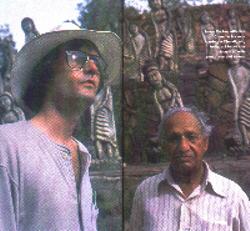 It was The Rock Garden, says Cocker that was the most "fitting place to end. Chand [pictured right, with Jarvis] is a good example of how an Outsider artist could be: he's been integrated and doesn't exist on the margins anymore, but is still completely himself." That sort of solid integrity, maintaining ones sense of self while earning proper dues for your work, seems to move Cocker. "I hope," says the man who waited more that a decade to become recognised, "that things like this always find a way to get through."
It was The Rock Garden, says Cocker that was the most "fitting place to end. Chand [pictured right, with Jarvis] is a good example of how an Outsider artist could be: he's been integrated and doesn't exist on the margins anymore, but is still completely himself." That sort of solid integrity, maintaining ones sense of self while earning proper dues for your work, seems to move Cocker. "I hope," says the man who waited more that a decade to become recognised, "that things like this always find a way to get through."
I meet Cocker again in London. He still has that edge of polite fatigue. Critics liked Pulp's album This Is Hardcore, but it has not sold well, and Cocker has dropped out of the A-list glare. But he is still famous. Last year he bought a house in east London's Hoxton, and the estate agent told the local paper. An evening or two later, he was wassailed in the middle of the night by drunks singing Common People up at the window.
Perhaps the programme has come at the right time for Cocker, reminding him of the real reasons for his work, honed on the dole and crucially, at art school. Jarvis Cocker, BA Hons (2:2) Central St Martins, went to college at 25: "I guess I was a mature student. Didn't act very mature though." He got in with two short films made on a camera bought from a jumble sale, which he transferred "badly" on to video. At first, he liked the maverick atmosphere. "They seemed to choose people from completely different backgrounds. It was a kind of Noah's Ark of differing sexual persuasions and racial characteristics."
But he became disillusioned. "The rot was starting to set in as we finished. The way everything has to be run as if it's a business, encouraging people to do greetings card designs. That's really bad and that's the way art education is going." Issues such as this seem to fire Cocker, who despite the fey exterior, comes over as a serious and moral person, as happy discussing social issues such as Care in the Community or education as he is discussing pop. One can almost see him joining his mother (a Conservative, incidentally) in politics as a Real Labour candidate, or joining the Question Time panel.
Anyway, by the end of his degree, "I really hated most of the people there. It seemed to me that most of the people went for the pose - maybe I did too. They were more into talking about art than creating it. There always had to be an agenda, a 'sub text' rather than making stuff because you actually enjoy it." Indeed, he maintains that Pulp work in an "instinctive way" rather than an "intellectual way", confounding those fans of his who analyse his lyrics, Bob Dylan-style. Hence Cocker's fascination with the Outsider artists, driven to create for their private imaginative and psychological reasons. Indeed he almost beams as he talks of Simon Rodia, architect of Watts Towers in Los Angeles and one of the show's Outsider artists. "He'd put all this intricate stuff like broken glass which no other human being was going to see. The birds can see it and that's it. Then, when it was finished after 30-odd years he just gave the deeds to a neighbour and disappeared. The idea that this little bloke just did it really gratuitously - I found that really impressive."
Watts Towers is one of the toughest parts of east Central Los Angeles. "They told us we'd have to get security," says Cocker. "You could tell it was a rough neighbourhood. Apparently we did get checked out at one point - there was a slow drive-by. But then they realised" - he puts on a sonorous biblical voice - "that we Meant No Harm".
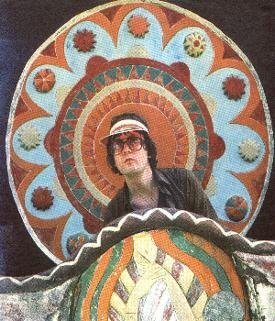 As I witnessed in Chandigarh, Cocker is very game. He clambered around, drove cars himself - in fact, probably enjoyed being anonymous. And he seems genuinely affected by the work. "The stunning thing about Watts Towers is that they were all done by one bloke," he says. The crew also filmed Le Palais Ideal, a French environment by postman Ferdinand Cheval. "He was considered to be mad and was treated with suspicion," says Cocker, in rueful empathy. "But the joke is now that the environment is a big tourist attraction and brings in lots of money for the town. They love it now." The team also went to film Edward James's dream palace in Xilitla, Mexico. James was an eccentric British surrealist with friends in high places. "He doesn't really fit into the Outsider Art thing - he had a lot of money and he was aware of other artists - but the scale of the place is amazing and there's all these massive towers and staircases with no handrails that go to nowhere," he says. "He wanted people to get a lurching feeling."
As I witnessed in Chandigarh, Cocker is very game. He clambered around, drove cars himself - in fact, probably enjoyed being anonymous. And he seems genuinely affected by the work. "The stunning thing about Watts Towers is that they were all done by one bloke," he says. The crew also filmed Le Palais Ideal, a French environment by postman Ferdinand Cheval. "He was considered to be mad and was treated with suspicion," says Cocker, in rueful empathy. "But the joke is now that the environment is a big tourist attraction and brings in lots of money for the town. They love it now." The team also went to film Edward James's dream palace in Xilitla, Mexico. James was an eccentric British surrealist with friends in high places. "He doesn't really fit into the Outsider Art thing - he had a lot of money and he was aware of other artists - but the scale of the place is amazing and there's all these massive towers and staircases with no handrails that go to nowhere," he says. "He wanted people to get a lurching feeling."
Outsider Art is now in danger of becoming fashionable. An annual art fair takes place in New York, to which Cocker went last year. "It was a bit horrible, really," he says. "What I found most distasteful was a couple of dealers who had brought along a few artists and plonked them down in the chair, and it was a bit like a freak show. Also it was like any other art fair, with people kissing each other on the cheek. That's the side of it that I find difficult to deal with." Here, Cocker gives vent to his inner Yorkshireman, with that county's hatred of all that is poncey, fancy and phoney. Outsider Art, made for the purest and least mercenary of motives, now has its own market. "It is collected, there are magazines about it, and all that side I find odd," says Cocker. "I also find it slightly troublesome about our programme. You want people to be aware that this stuff exists but you don't want to be part of the process that turns it into another commodity to be sold."
That's showbiz, one is tempted to say, but at least Cocker has tried to examine his own interest in the Outsider artists. "There is the idea that people might just get off on the primitive and naïve weirdness of the people, like the more exotic their story, if this person's in a mental institution for 50 years, the more we all seem to like it," he says, adding that it was impossible to ignore that most of the Outsider artists filmed were old. "We started thinking that as the mass media has now become so pervasive, is it possible for these people to exist outside the culture anymore? And we never really answered that question." He personally likes to think that there are younger artists out there making new fantasy environments, although Britain seems to have always been low in them. "There was a bloke called Billy Moore in Twickenham," says Cocker, "and a shell-garden with rocks from all over the world." And that's it. Then again, maybe Britain's Outsiders start bands instead.
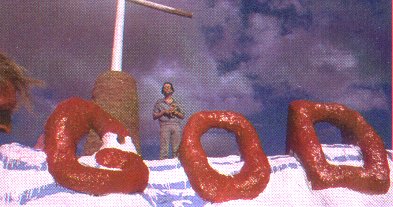
Cocker's aura of disenchantment chimes with the critical reception for This Is Hardcore, which was predicated around his disillusionment and the dark side of fame. "Too much has been made of that," he now says. "I hope the overriding message is not that life is just a long worthless drudge. It isn't." At least this fame allows him to make programmes about his enthusiasms. "A lot of things have come along which are irritating," he says, "and sometimes you can feel it stops you from doing things because you feel yourself to be under more scrutiny. It was important for me to find a way of making that [fame] work for me."
Cocker emphasises that he does not want to be a TV presenter, though he has made several appearances on the small screen, including a sweeping performance on Pop Quiz and on Shooting Stars. "I did that for one reason," he says. "I found it very funny. Vic and Bob asked and I though it would be churlish to refuse. Anyway, I enjoyed it," he says, modifying his response from peevish to pervy. "I enjoyed being humiliated."
Yet a couple of years ago, having eluded success for so long, Cocker dipped several toes in the media circus and gained a near ubiquitous media profile. "At that time I thought it important," he explains. "Coming from what is considered to be the 'indie' music scene, and having grown up in the eighties and feeling marginalised, I thought, let's seize that chance to infiltrate the mainstream, go on TV and prove that people from our kind of background could string sentences together." He has now moved away from this quaint notion. "I now think the mainstream has a debilitating effect on people's creativity and integrity, because it takes your talent away from you, blands it out, emasculates it and castrates it."
Despite his arty insouciance, giving a falsely carefree impression, Cocker struggled to swim in the whirlpool of fame. About two years ago he went out ligging a lot, and some felt he might be indulging some kind of life-as-art Warholesque game. "No. That was a difficult time for me, and I couldn't pretend I knew what I was doing. It was getting used to a new mode of existence, and exploring what that lifestyle had got to offer. In the end I decided I didn't like it. It gets boring and you run the risk of making mistakes." These include his notorious Michael Jackson bottom-waggling intervention. Nor did he enjoy the intrigue in his private life, recently raked-over again when long-term girlfriend Sarah finally vaporised in favour of Cocker admirer, actress Chloe Sevigny.
The crux came when his wax doppelgänger was revealed at London's Rock Circus. "The absurdity appealed to me," he recalls. "I thought, I'm never going to have another chance to have a waxwork made of me so let's do it." Then, in some talismanic way the waxwork helped him. "It objectified what had happened to me in concrete form, and made me accept that there were two versions of me around, a public version and a real version," he says. "My public persona is there. So it stops me from being such a... prick. Worrying about everything all the time." One could almost accept Cocker's waxwork as his conceptual art piece. "You could," he responds. "After all, Gavin Turk made that waxwork of himself as Sid Vicious."/p>
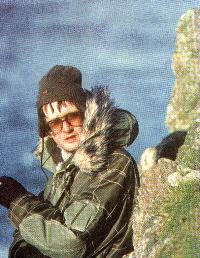 Now Cocker could become a kind of visual arts grandee-cum-dilettante. He is dabbling with making films, plays alongside avant-garde US musicians and is a patron of the Institute of Contemporary Arts - although he doesn't "know what it means". Just lending your name? "I guess so, yeah." As with the programme his famous identity is being used to spin up some cultural capital, a process which seems to confuse him.
Now Cocker could become a kind of visual arts grandee-cum-dilettante. He is dabbling with making films, plays alongside avant-garde US musicians and is a patron of the Institute of Contemporary Arts - although he doesn't "know what it means". Just lending your name? "I guess so, yeah." As with the programme his famous identity is being used to spin up some cultural capital, a process which seems to confuse him.
Cocker says he has "no idea" how his music audience will take the Outsider programme. Nor does he particularly care. Who are his audience? "I don't know," he says. "Honestly. I can't see them because I've got the light shining in my eyes." He talks about how appalled he was at the twentieth anniversary of Abigail's Party TV special, particularly as Mike Leigh is a bit of a hero. "All it did was emphasise the kitch aspects. They made it this document of the 'wacky' Seventies. It's, like, you finally get some appreciation," says Cocker, leaving a meaningful pause, "but is it the right kind?" He wants to rid himself of the polluting media excess, to regain the simple enthusiasms he once had. "I've been trying to stop myself from reading magazines, because you end up with opinions of things that you know nothing about. I'm sick of reading reviews of films that I never see. I just try to read books so at least I get something real." We all have those must-improve-myself moments, I venture. "There's got to be some hope for us all," he agrees. The Outsider artists represent a font of redemption: of creativity, true values and art, for someone exhausted by the relentless give and take of public life.
 We walk through The Rock Garden while Cocker talks about his Outsider epiphany. "I was in the library at art school and came across this book by Roger Cardinal [Outsider Art]," he says. "It was evidence that artistic creation existed outside of institutions." Disillusioned by college and on holiday from Pulp, Cocker had a micro-Eureka, finding something appealing and authentic in the book's pages. Indeed, it is tempting to assume that the 36-year-old singer found some kinship with the Outsiders - here, after all, is the man who spoke up for life's "misshapes, mistakes, misfits", and whose personal style remains eccentric: close up Cocker has one extra-long thumb nail, foppish long locks and an unexpected crop of chest hair. But cocker is no raw ingénu. He peers through his aviator-style glasses in his mistrustful myopia - the legacy of childhood meningitis - and greets questions with a very weary monotone "oh, aye". His native Yorkshire suspicion has combined with press overkill to create a hostile barrier of ennui. Forget the flip, frivolous wit of Nineties pop folklore: these days Cocker presents a somewhat dour, curmudgeonly face to the world.
We walk through The Rock Garden while Cocker talks about his Outsider epiphany. "I was in the library at art school and came across this book by Roger Cardinal [Outsider Art]," he says. "It was evidence that artistic creation existed outside of institutions." Disillusioned by college and on holiday from Pulp, Cocker had a micro-Eureka, finding something appealing and authentic in the book's pages. Indeed, it is tempting to assume that the 36-year-old singer found some kinship with the Outsiders - here, after all, is the man who spoke up for life's "misshapes, mistakes, misfits", and whose personal style remains eccentric: close up Cocker has one extra-long thumb nail, foppish long locks and an unexpected crop of chest hair. But cocker is no raw ingénu. He peers through his aviator-style glasses in his mistrustful myopia - the legacy of childhood meningitis - and greets questions with a very weary monotone "oh, aye". His native Yorkshire suspicion has combined with press overkill to create a hostile barrier of ennui. Forget the flip, frivolous wit of Nineties pop folklore: these days Cocker presents a somewhat dour, curmudgeonly face to the world.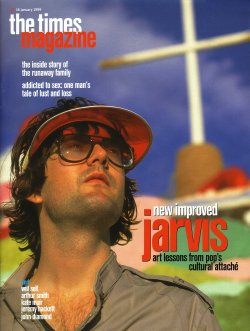 The Outsider
The Outsider It was The Rock Garden, says Cocker that was the most "fitting place to end. Chand [pictured right, with Jarvis] is a good example of how an Outsider artist could be: he's been integrated and doesn't exist on the margins anymore, but is still completely himself." That sort of solid integrity, maintaining ones sense of self while earning proper dues for your work, seems to move Cocker. "I hope," says the man who waited more that a decade to become recognised, "that things like this always find a way to get through."
It was The Rock Garden, says Cocker that was the most "fitting place to end. Chand [pictured right, with Jarvis] is a good example of how an Outsider artist could be: he's been integrated and doesn't exist on the margins anymore, but is still completely himself." That sort of solid integrity, maintaining ones sense of self while earning proper dues for your work, seems to move Cocker. "I hope," says the man who waited more that a decade to become recognised, "that things like this always find a way to get through." As I witnessed in Chandigarh, Cocker is very game. He clambered around, drove cars himself - in fact, probably enjoyed being anonymous. And he seems genuinely affected by the work. "The stunning thing about Watts Towers is that they were all done by one bloke," he says. The crew also filmed Le Palais Ideal, a French environment by postman Ferdinand Cheval. "He was considered to be mad and was treated with suspicion," says Cocker, in rueful empathy. "But the joke is now that the environment is a big tourist attraction and brings in lots of money for the town. They love it now." The team also went to film Edward James's dream palace in Xilitla, Mexico. James was an eccentric British surrealist with friends in high places. "He doesn't really fit into the Outsider Art thing - he had a lot of money and he was aware of other artists - but the scale of the place is amazing and there's all these massive towers and staircases with no handrails that go to nowhere," he says. "He wanted people to get a lurching feeling."
As I witnessed in Chandigarh, Cocker is very game. He clambered around, drove cars himself - in fact, probably enjoyed being anonymous. And he seems genuinely affected by the work. "The stunning thing about Watts Towers is that they were all done by one bloke," he says. The crew also filmed Le Palais Ideal, a French environment by postman Ferdinand Cheval. "He was considered to be mad and was treated with suspicion," says Cocker, in rueful empathy. "But the joke is now that the environment is a big tourist attraction and brings in lots of money for the town. They love it now." The team also went to film Edward James's dream palace in Xilitla, Mexico. James was an eccentric British surrealist with friends in high places. "He doesn't really fit into the Outsider Art thing - he had a lot of money and he was aware of other artists - but the scale of the place is amazing and there's all these massive towers and staircases with no handrails that go to nowhere," he says. "He wanted people to get a lurching feeling."
 Now Cocker could become a kind of visual arts grandee-cum-dilettante. He is dabbling with making films, plays alongside avant-garde US musicians and is a patron of the Institute of Contemporary Arts - although he doesn't "know what it means". Just lending your name? "I guess so, yeah." As with the programme his famous identity is being used to spin up some cultural capital, a process which seems to confuse him.
Now Cocker could become a kind of visual arts grandee-cum-dilettante. He is dabbling with making films, plays alongside avant-garde US musicians and is a patron of the Institute of Contemporary Arts - although he doesn't "know what it means". Just lending your name? "I guess so, yeah." As with the programme his famous identity is being used to spin up some cultural capital, a process which seems to confuse him.